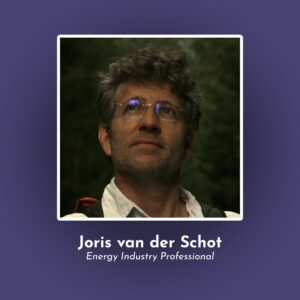
Show Summary
On this episode, Nate is joined by energy industry professional Joris van der Schot to explain the basics of oil refineries, their limitations, and other cultural narratives about energy. Oil is the lifeblood of our economies, yet most of us know so little about how it actually becomes all the different final products that we use. Just how massive is the scale of our energy consumption? How flexible and resilient are oil refineries to shifting oil demand? Can we keep an open mind to realistic and helpful innovations while also grounding our preparations for the future in practical energy strategy ahead of The Great Simplification?
About Joris van der Schot
Joris van der Schot is a former Royal Dutch Shell executive with over a decade of international experience in the oil industry, where he held roles as a control systems engineer, corporate strategy advisor, refinery economist and lastly, the company’s global aviation gasoline supply manager.After a sabbatical year in Provence, Joris left the oil industry and set out on a quest to accelerate the clean energy transition through breakthrough technology. He currently works at french scale-up Energy Pool, providing storage and other flexibility services that enable the integration of renewable energy on the electricity grid.
In French, we have a motto that says that a simple drawing is often better than a long explanation. Jean-Marc Jancovici Carbone 4 President
That’s very understandable because with left atmosphere thinking, one of the problems is that you see everything as a series of problems that must have solutions. Iain McGilchrist Neuroscientist and Philosopher
We can’t have hundreds and hundreds of real relationships that are healthy because that requires time and effort and full attention and awareness of being in real relationship and conversation with the other human. Nate Hagens Director of ISEOF
This is the crux of the whole problem. Individual parts of nature are more valuable than the biocomplexity of nature. Thomas Crowther Founder Restor
Show Notes & Links to Learn More
Download transcript00:25 – Joris van der Schot works + info
01:59 – Jurassic named after the Jura Mountains
04:45 – Human relationship with fire, Joris van der Schot on Man’s Metabolism
05:20 – Woodstock
05:30 – Niagara Falls, Rhine Falls
06:35 – IEA Barrel of Oil Equivalents + IEA Energy Sankey Data Tool
06:40 – A Niagara of Oil
07:37 – Sankey Diagram
09:45 – Mitochondria the powerhouse of the cell, ATP
12:23 – Geological variations in oil
13:58 – Peat, Joris van der Schot on Energy and GDP: the Dutch Golden Age
16:20 – Very Large Crude Carriers (VLCC)
20:30 – Chemistry of oil
29:09 – Record summer heat and all time hottest September – theories of sulfur removal being the cause
31:25 – Crackers
33:09 – Sulfur and acid rain
35:05 – Geoengineering
35:40 – Just Stop Oil Frankly Series
37:50 – Flexibility in refinery production
39:39 – Lack of new refineries in the US
40:45 – Europe refinery closures
41:52 – Emission impact of tar sands
43:10 – Energy intensity of schemes to pull carbon out of the air
44:01 – Natural systems that remove carbon from the air
45:53 – Exponential growth in microchip revolution – difference from solar development
49:29 – Primary vs final energy – increased efficiency with electrification
53:26 – Sodium batteries, Sand Batteries
53:38 – Iron rust battery storage
54:25 – Demand side energy solutions
55:10 – Industry centered when and where energy is available
57:15 – Reality Blind Vol. 1 – Nate Hagens and DJ White
58:42 – 80000 Hours
1:01:08 – Heliomimicry
1:04:05 – Google investment in fusion
1:06:03 – Reality Roundtable
Additional Reading:







